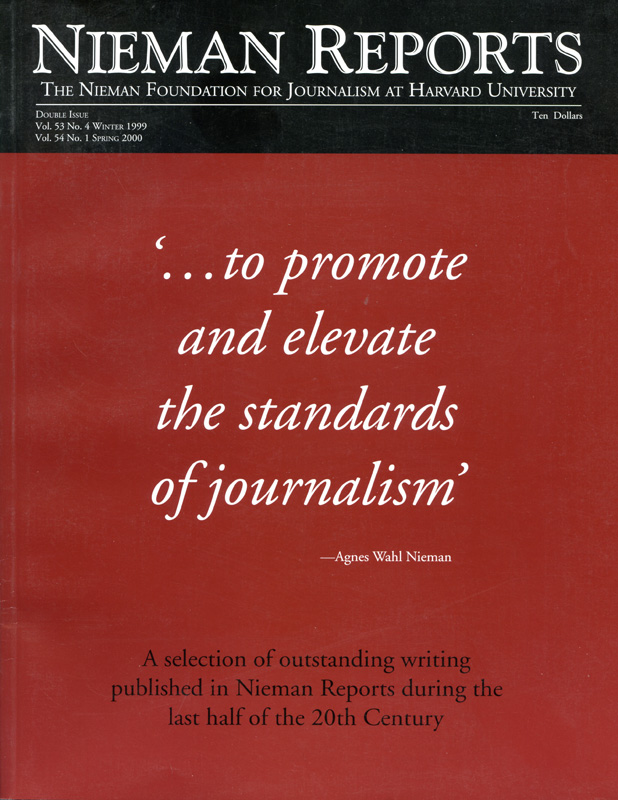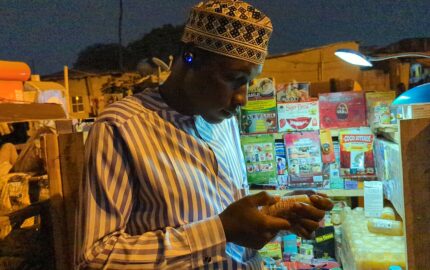
…[F]our main Western news agencies—Associated Press, United Press International, Reuters and Agence France-Presse—provide 90 percent of the daily wordage of the world, the AP alone claiming a third of the total. But they cover the news superficially. In Kuala Lumpur, where I live, they report on the “coups and earthquakes” and the government viewpoint, providing their objectivity in those human rights appeals, over the next hanging. The Reuters bureau is described by its head office in London as a profit center because of the money it makes out of its economic services, and one does get the impression that the news they send out would never be allowed to “kill the golden goose.” While Americans, particularly, sneer at the French government’s subsidy for the Agence France-Presse, that agency provides the best service out of Southeast Asia, as it does out of Kuala Lumpur. But none of them report on the main issues—the rise of Islamic fundamentalism, the government decision to impose a national culture based on the culture of the politically dominant Malay community—or, indeed, what makes this country tick. This attitude towards news coverage can be extended to most countries in the Third World.
Taken globally, the United States and Europe share about 40 percent of the foreign correspondents while Africa has one percent. The American agencies, newspapers, radio and television stations have about half their correspondents overseas, much less than what it used to be, in Europe, and most of the European foreign correspondents are in the United States. So Europe and the United States are better covered than the rest of the world. The Third World and others get their share of attention only when something out of the ordinary takes place. Few Americans would have heard of Uganda until Idi Amin came on the scene or, for that matter, Vietnam before the American involvement.
The demand for a new international information order, which UNESCO has been spearheading, should be seen in this light. News of the Third World in the rest of the world, and even in the Third World itself, often comes through Western agencies which are seen, with some justification, as unsympathetic. These complaints are extraordinarily similar to those made by the United States at the turn of the century against the domination of its news overseas by Reuters. Kent Cooper, the former General Manager of the Associated Press, once wrote a book about this imbalance. He stated: “So Reuters decided what news was to be sent from America. It told the world about the Indians on the war path in the West, the lynchings in the South, and bizarre crimes in the North. The charge for decades was that nothing creditable to America ever was sent.”
The Third World argument is that this criticism can be extended to the Western news agencies, including the AP and UPI. Whether any change should be orchestrated by such a bureaucratic, politicized body as UNESCO is another matter. But the central complaint of bias cannot be faulted. Two examples will suffice. When the Jonestown tragedy happened, American reporters at the scene trying to put the issue in context described Guyana as a country that spoke a form of pidgin English and where illiteracy was a major problem. In fact, 85 percent of the people are literate and they speak a pure strain of English, albeit in a local pronunciation, but certainly it is better understood than the patois and pidgin I heard spoken in the United States during my Nieman year. The reports I read on the tragedy tended to fault the government in having allowed the setting up of Jonestown without mentioning that the government was clutching at any straws to help alleviate its economic problems. The other was a cable I received from an American newsmagazine I write for after a Malaysian cabinet minister was sentenced to death for murdering a political rival. It read in part: “Since he was a rising star of the ruling party, how come his clout did not get him off?”
This assumption that fair play, justice and other ideals that the West hold dear cannot be transplanted is widespread, because these efforts are not highlighted, only the transgressions, in stories. Would that the editor had asked such a question to reporters when the magazine was hounding President Nixon over the Watergate affair. Why is it that when General Motors or Ford raises car prices, it is because of inflation, while oil prices rise because of the “greedy” Arabs?
Unfortunately, the world’s news values are dictated by the major Western agencies, who themselves are not prepared to have an international team of correspondents on a par with their home-based staff. Reuters has a corps of predominantly British correspondents, just as the American agencies have mostly Americans. When they do have local correspondents, they limit them to a single country or a region. Agencies do have other nationalities as correspondents but they are, invariably, European or from one of the white countries of the British Commonwealth—Australia, New Zealand, Canada, South Africa and, of course, the United States. Citizens of other countries who are correspondents are so rarely on a par with home-based staffs that they count in few people’s calculations. If these agencies had considered this aspect of their operations, the criticism against them would not have been so severe.
The well-intentioned plea, like that 60 years ago against the Reuters’ domination of American news, is being argued out of existence by the bureaucrats and journalists of the Third World and Western governments with such premises as apparent threats to freedom of the press or the management of news. This confrontation hides the similarities that exist among governments and among journalists, whether they come from rich, poor, capitalist or Communist countries. The desire to control unfavorable information is common to governments everywhere, only the degree of control differs. And journalists everywhere have the instinct to find out what is happening. The tighter the official control of the press, I have found, the better informed the journalists seem to be.…
The blanket denunciation by the Western news agencies of the UNESCO proposals stems from a contested thesis that this would inhibit the free flow of news. Perhaps it would. But my argument is that there is no free flow of news along the lines the Western media suggest. We in the Third World still know more about the lives of Hollywood film stars and the newly rich in the West than we do about our own neighboring countries. An accident on an American freeway still rates better coverage in Malaysia than a landslide in Indonesia that kills hundreds, and it highlights the priorities of the agencies rather than the sub-editor who selects the news on his daily paper, radio and television station and who is often unfairly blamed for it.
It was the United States which while providing all possible help to reporters to cover the news, nevertheless, put incredible restraints on what they could report. And its penchant for a free press does not extend to the countries considered to be within their orbit: The fact that the Western press was unprepared and shocked at the speed with which the Shah of Iran fell was an admission that it had not covered the country properly. Even The New York Times did not have a man in Tehran when the troubles started, although for nearly two decades Iran was the linchpin of the American effort in the region.
If those correspondents who covered Iran as part of their Middle Eastern beat had done their homework and filed stories about the havoc caused by Harvard or Stanford graduates and others of that ilk by their “modernization” schemes on a country ill-prepared for them, the journalists might have been expelled for their pains, or worse. But at least their readers and viewers would have understood why a septuagenarian exile was able to turn the country upside down in less than a year after the Shah left.
The Western denunciation of the UNESCO scheme appears to be based on geopolitics rather than the desire for a free press. But the Western media do not seem to have any plans for changes except broad generalities. The feeling of being manipulated in a Cold War confrontation is not a situation that Third World countries like to live with. One reason why they support the Soviet espousal of their cause with enthusiasm is that they hope to stand on their own feet in the end.
The Western contention that ultimately it [the UNESCO plan] could only be disastrous is of little import to a country already drowning in its own problems. Any straw is to be grasped, and the enemy you don’t know may turn out to be your friend, but if it doesn’t work out that way, then the already tight belt must be made a little tighter. But it always has been like that since independence. The desire to control one’s destiny is not news, and the new information order is one expression of that feeling. But what is the West doing about it?
M.G.G. Pillai, a 1977 Nieman Fellow, is a freelance writer living in Kuala Lumpur, Malaysia.


